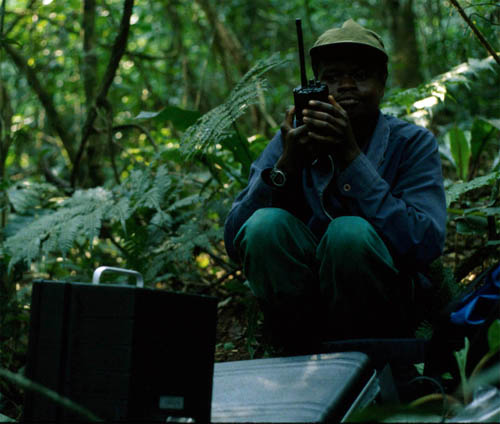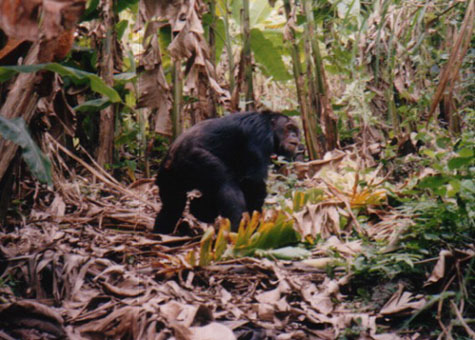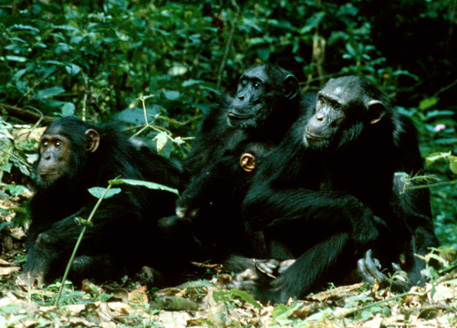Chimpanzees Know When to Keep Quiet
Michael L. Wilson- wilso198@tc.umn.edu
Gombe Stream Res. Ctr., P.O. Box 1182, Kigoma, Tanzania,
and Dept. of Ecol., Evol. & Behav., Univ. of Minnesota, St. Paul, MN 55108
Marc D. Hauser and Richard W. Wrangham
Harvard Univ., Cambridge, MA 02138
Popular version of paper 2aAB4
Presented Tuesday morning, October 18, 2005
ASA/NOISE-CON 2005 Meeting, Minneapolis, MN
Chimpanzees are well known for being loud, noisy animals. Film
depictions of chimpanzees usually show them whimpering, hooting,
screaming and generally making a ruckus (sound).
However, chimpanzees are also well known for being intelligent, and
by using field experiments and naturalistic observations we have
found new evidence that chimpanzees know when to keep quiet.
Studying wild chimpanzees in Kibale National Park, Uganda, we looked
at three situations where chimpanzees should keep quiet: during a
simulated intrusion by a foreign male, during visits to the edge of
their territory, and when raiding people's farms outside the park.

Male chimpanzees cooperatively defend group territories against
foreign males, and sometimes attack and kill members of neighboring
groups. Because of this, it is extremely dangerous for chimpanzees to
pick a fight with the neighbors in cases where they might be
outnumbered. To test whether chimpanzees know when to keep quiet, we
used a hidden speaker to play back the loud "pant-hoot" call of a
foreign male chimpanzee.

When at least
three male chimpanzees were gathered together, they responded to the
intruder's call with loud calls of their own and rapidly approached
the hidden speaker. If only one or two males were present, however,
they stayed quiet, were less likely to approach the speaker, and if
they did approach the speaker, moved more slowly. Females without
males present stayed quiet and sometimes fled from the phantom
intruder. These experiments thus demonstrated both that chimpanzees
have some basic mathematical ability, and that they know to keep
quiet unless the odds seem clearly in their favor.
In addition to conducting these experiments, we followed chimpanzees
and recorded their natural behavior in different parts of their
range. Earlier studies had reported that chimpanzees were unusually
quiet when patrolling their borders, but no one had taken data on
call rate in other contexts to test whether they really were quiet
compared to when they visited other parts of their range. Moreover,
if chimpanzees use their loud calls to defend their range, like
lions, wolves, and other animals do, we might expect them to actually
make more noise during visits to the edge of their territory, rather
than staying silent.
We found that chimpanzees rarely visited the edge of their range, and
when they did so, they traveled in parties with many males, probably
seeking safety in numbers. Moreover, we found that chimpanzees didn't
always stay silent during these border visits. In the early morning,
in fact, they actually called more often - perhaps because they had
had a chance to listen during the night to whether the neighbors were
nearby. Considering the whole day, however, chimpanzees did tend to
call less often in border areas, compared to other parties with the
same number of males observed at the same time of day.
The chimpanzees we studied live at the edge of the park, and
sometimes, when food is in short supply in the forest, they raid
people's farms outside the park, knocking down banana plants to eat
the stems and sometimes stealing sugar cane and other crops. Although
chimpanzees usually give loud calls when they arrive at a rich food
source, they stayed strikingly quiet during these crop raids.

Together, these experiments and observations show that despite their
reputation as noisy, excitable animals, chimpanzees can keep quiet
when they need to.

[ Lay Language Paper Index | Press Room ]



